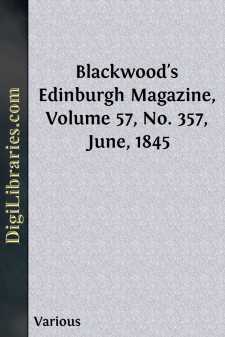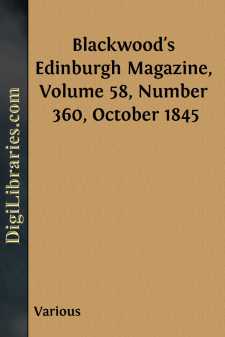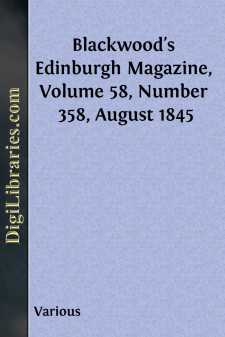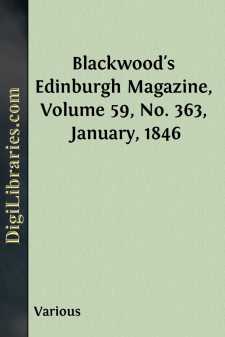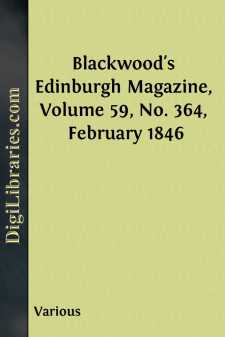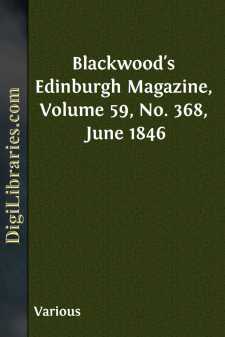Fiction
- Action & Adventure 180
- Biographical 15
- Christian 59
- Classics
- Coming of Age 5
- Contemporary Women 3
- Erotica 8
- Espionage/Intrigue 12
- Fairy Tales, Folklore & Mythology 236
- Family Life 169
- Fantasy 117
- Gay 1
- General 596
- Ghost 32
- Historical 808
- Horror 43
- Humorous 160
- Jewish 25
- Legal 4
- Medical 22
- Mystery & Detective 315
- Political 49
- Psychological 41
- Religious 64
- Romance 159
- Sagas 11
- Science Fiction 730
- Sea Stories 113
- Short Stories (single author) 537
- Sports 10
- Suspense 1
- Technological 8
- Thrillers 2
- Urban Life 31
- Visionary & Metaphysical 1
- War & Military 173
- Westerns 199
Classics Books
Sort by:
by:
Various
PÚSHKIN, THE RUSSIAN POET. No. I. Sketch of Púshkin's Life and Works, by Thomas B. Shaw, B.A. of Cambridge, Adjunct Professor of English Literature in the Imperial Alexander Lyceum, Translator of "The Heretic," &c. &c. Among the many striking analogies which exist between the physical and intellectual creations, and exhibit the uniform method adopted by Supreme Wisdom in the...
more...
by:
Various
ENGLISH LANDSCAPE—CONSTABLE. The appearance of the second edition of Leslie's Life of Constable invites attention to this truly English and original artist. We have read this volume with much interest. It is a graceful homage paid by a great living painter to the memory of one who is no more: a kindly, and, as we believe, an honest testimony to the moral and professional worth of one whose works...
more...
by:
Various
It might have been expected, that after the march into Bavaria had demonstrated the military genius of the Duke of Marlborough, and the battle of Blenheim had in so decisive a manner broken the enemy's power, the principal direction of military affairs would have been entrusted to that consummate commander; and that the Allied cabinets, without presuming to interfere in the management of the...
more...
by:
Various
MONTESQUIEU. Montesquieu is beyond all doubt the founder of the philosophy of history. In many of its most important branches, he has carried it to a degree of perfection which has never since been surpassed. He first looked on human affairs with the eye of philosophic observation; he first sought to discover the lasting causes which influence the fate of mankind; he first traced the general laws which...
more...
by:
Various
ON PUNISHMENT. How to punish crime, and in so doing reform the criminal; how to uphold the man as a terror to evil-doers, and yet at the same time be implanting in him the seeds of a future more happy and prosperous life—this is perhaps the most difficult problem of legislation. We are far from despairing of some approximation to a solution, which is the utmost that can be looked for; but we are also...
more...
by:
Various
SIR WILLIAM FOLLETT. The disappearance from the legal hemisphere of so bright a star as the late Sir William Follett, cast a gloom, not yet dissipated, over the legal profession, and all classes of society capable of appreciating great intellectual eminence. He died in his forty-seventh year; filling the great office of her Majesty's Attorney-general; the head and pride of the British Bar; a...
more...
by:
Various
SERVIA AND THE "SERVIAN QUESTION." The principality of Servia was, a few years since, scarcely known to the English public except as an obscure province of the Ottoman empire, into which few travellers had penetrated; and of the population, internal resources, &c., of which, little information existed, and little curiosity was felt. But the singular political drama of which it has lately...
more...
by:
Various
Part the Last. There was a crowd and a clamour in the principal coffee-house of Pampeluna at nine o'clock on a July evening, that of the first day after Don Baltasar's escape from the town. The numerous tables were surrounded by officers of Cordova's army, still flushed with their recent victory, and eager to enjoy to the utmost a period of relaxation, which, for aught they knew, the...
more...
by:
Various
Lord Brougham has resumed his memoirs of the eminent writers of England; and every lover of literature will feel gratified by this employment of his active research and of his vigorous pen. One of the most striking distinctions of English public life from that of the Continent, is in the condition of statesmen after their casual retirement from power. The Foreign statesman seems to exist only in...
more...
by:
Various
In order to deal effectively with pauperism, it is necessary to know the causes which lead to the impoverishment of individuals and masses of individuals, and to be familiar with the condition, manners, customs, habits, prejudices, feelings, and superstitions of the poor. We do not propose to institute an elaborate inquiry into the causes of pauperism, or to make the topic a subject of separate...
more...


